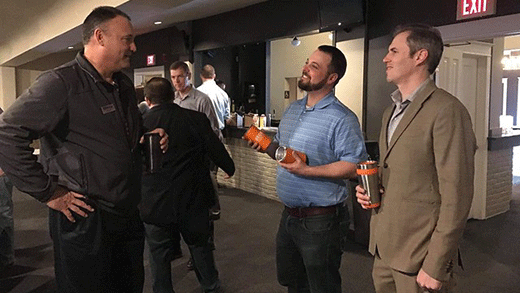
(Left to right) Jonny Heath, organizer Joe Gerken, and Tim Gregory visit between presenters at a One Million Cups event. Networking is encouraged during the program. Photo courtesy of Cynthia Naughton Photography | Download this photo.
Kansas Profile – Now That’s Rural: One Million Cups
May 15, 2019
One million cups of coffee. That’s a lot of caffeine. It’s also much more than that, since this is the term for a movement which is supporting entrepreneurs across the nation. This program is building a peer support network to help those who are starting and growing their businesses.
Amber Starling and Joe Gerken are among the organizers of the Manhattan, Kansas chapter of this group called One Million Cups. Last week we learned about another of the organizers, Darin Miller. He operates Iron Clad Coworking Space with facilities in Manhattan and in the rural community of Wamego, population 4,272 people. Now, that’s rural.
The One Million Cups concept was begun by the Ewing Marion Kauffman Foundation in 2012. The idea was simple: Great ideas are discussed over a million cups of coffee. The Kauffman Foundation wanted to create a time and place where entrepreneurs could share with each other. Coffee was provided and entrepreneurs were brought together in Kansas City. The results were remarkable.
The format began to spread across the nation. One Million Cups chapters have now sprung up in 181 communities across the country. This includes the Kansas communities of Lawrence, Topeka, Wichita, and Manhattan. The program started in Manhattan in 2017.
What happens at a One Million Cups event? The format is that two presenters have six minutes each to present an overview of their businesses. This is followed by questions and answers with the audience. The final question posed to each presenter every time is: “What can we as a community do to help you?”
As the question demonstrates, this is intended to be a supportive environment for the budding entrepreneurs or business owners. Who attends this event? “We have entrepreneurs, insurance agents, realtors, bankers, chamber of commerce staff, and more,” Amber Starling said. No reservations are required and no admission is charged. Even the coffee is free.
These events are held on a regular basis. In Manhattan, One Million Cups sessions are conducted on the first Wednesday of each month at the Wareham Theater.
“This is a grassroots effort to get entrepreneurs together,” Joe Gerken said. “Being a business owner can be lonely,” he said.
“This provides a safe space for entrepreneurs to share a big idea, here’s what worked, and here’s my challenges,” Amber said. The process of presenting helps focus the entrepreneur’s ideas. The feedback from his or her peers can be especially valuable.
Joe and Amber are past presenters at One Million Cups themselves. Joe talked about the business he started which is Flint Hills Moving. This moving company is in its third year and has grown to 10 employees. “We specialize in customer service,” Joe said. The company website is www.flinthillsmoving.com.
Amber presented about her business which is Good Witch Cleaning Services, with the only certified cleaning technicians in Kansas. Her business is almost two years old and has grown to six employees. “We thrive on perfection,” Amber said. Her company website is www.goodwitchcleaning.com.
After presenting at One Million Cups, Amber and Joe had the opportunity to apply to become event organizers and were selected. They now lead the monthly discussions. “We want to draw from the outlying communities too,” Amber said.
To present at One Million Cups, entrepreneurs must apply. Not everyone gets selected. A successful applicant is assigned an organizer to help them plan and prepare their presentation.
“Most people focus on their journey,” Joe said. “We get to help connect the dots.”
“We can help them get to where they need to go,” Amber said. “And the coffee is free.”
For more information, go to www.1millioncups.com/manhattan.
One million cups. That’s a lot of caffeine, but it’s also the name of a program which allows entrepreneurs to share their ideas and challenges with others. We commend Amber Starling, Joe Gerken, Darin Miller, and all those involved with One Million Cups for making a difference by enabling entrepreneurs to come together in this way. If I had a new business and I didn’t want it in the red, maybe One Million Cups could help me keep it in the black. Coffee, that is.
Audio and text files of Kansas Profiles are available at http://www.kansasprofile.com. For more information about the Huck Boyd Institute, interested persons can visit http://www.huckboydinstitute.org.
----------------
The mission of the Huck Boyd National Institute for Rural Development is to enhance rural development by helping rural people help themselves. The Kansas Profile radio series and columns are produced with assistance from the K-State Research and Extension Department of Communications News Media Services unit. A photo of Ron Wilson is available at http://www.ksre.ksu.edu/news/sty/RonWilson.htm.

